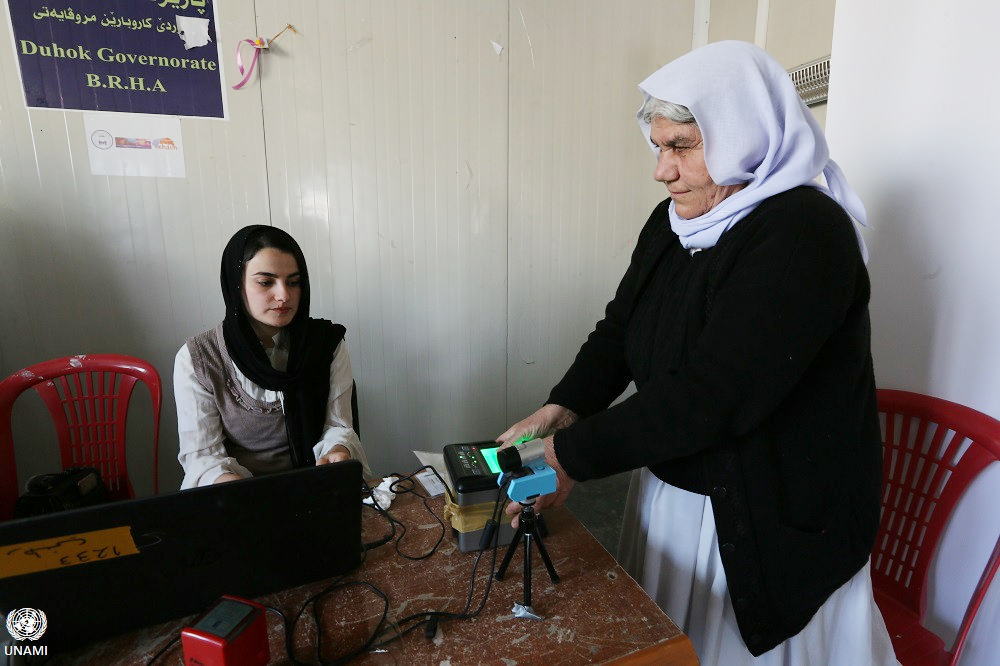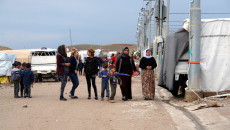Over 50,000 Internally Displaced People IDP, mostly inside IDP camps, in Dohuk Northern Province have completed, for the first time, the procedures for issuing a voter card and are ready to cast their votes in the Iraqi provincial council elections.
These statistics came after an intensive campaign by the Independent High Electoral Commission in Iraq IHEC by opening 41 special centers inside the camps and forming 15 mobile teams with the aim of encouraging the IDPs and providing facilities for them to obtain a voter card. The campaign continued until August 20.
According to the third amendment to the Law of Elections for the House of Representatives and Provincial Councils, which was approved by the Iraqi Parliament on March 27, 2023, the displaced person residing inside the camps has the right to cast his vote for the electoral district affiliated with his area of origin, and with regard to the displaced people of Shingal (Sinjar) district, home town for the non-Muslim Ezidi community, they can vote directly for the Sinjar electoral constituency inside or outside the camp.
Sabri Amin, 19, one of the IDPs who completed the procedures for issuing a biometric voter card inside the camp, said, “I want to participate in the elections this time and cast my vote,” though he has not received his electoral card yet, because he lost the receipt for receiving the card.
I want to participate in the elections this time and cast my vote
Amin is originally resident of the Tal Al-Banat complex in Sinjar district. He has lived for nine years in the Kabartw camp for IDPs in Dohuk. Two months ago, he visited one of the IHEC centers in the camp to complete the procedures.
He is one of thousands of new displaced voters in Dohuk who are waiting to participate in the provincial council elections scheduled to be held on December 18 of this year.
In the 2021 parliamentary elections, over 120,000 IDPs were entitled to vote, according to statistics from the IHEC, 69,000 of them were in Dohuk, yet it is not clear how many of this number have returned to their original areas during the past two years.
Over 664,000 IDPs live in the Iraqi Kurdistan Region IKR, most of them from Nineveh Province, specifically from Sinjar District, and 30% are Ezidis (Yazidis). There are 15 camps for IDPs in Dohuk where 135,616 IDPs reside.
Khaled Abbas, director of the Dohuk office of the IHEC, told (KirkukNow) that based on the amendment to the law on elections for the House of Representatives and provincial councils, they have opened 41 special centers for the displaced and formed 15 mobile teams to facilitate procedures.
During this period, 51,000 people completed voter card issuance procedures, about 43,000 of them are inside the IDP camps and the rest are living outside the camps, Abbas added.
51,000 people completed voter card issuance procedures, about 43,000 of them are inside the IDP camps
This comes at a time when the number of IDPs residing inside the camps is less than those residing outside them, almost 190,000 IDPs, according to the Dohuk office of the Iraqi Ministry of Migration and Displacement.
According to the law, displaced people residing outside the camps - with the exception of Yazidis - must go to their areas of origin to cast their votes, while displaced people residing inside the camps and displaced Yazidis living outside the camps can also cast their votes for the electoral districts affiliated with their governorates in the areas in which they reside.
The Election Commission and the Ministry of Immigration and Displacement do not have accurate statistics on the number of displaced people who are entitled to vote, and they have not issued a voter card. According to the Commission’s decisions, the deadline for voter card issuance was August 20, 2023.
Iskandar Muhammad Amin, director of the Office of the Ministry of Immigration and Displacement in Dohuk, told (KirkukNow), “Our teams and UNHCR centers are performing their tasks well. We have done everything in our power so that the displaced are not deprived of the right to vote, and we are ready to provide all facilities to them.”
Each governorate is considered an electoral constituency in the governorate council elections.
The Iraqi provincial councils were dissolved at the end of 2019 under the second amendment to the provincial council elections law, which was one of the demands of Tishreen (October 2019) protesters in Baghdad and several other provinces against corruption, left hundreds of civilians killed and thousands injured.






